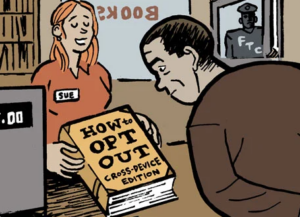 In a hearing held by the Senate Commerce Committee, Chairman John “Jay” Rockefeller (D-W.Va.) accused the ad industry of dragging its feet on the creation of specs for a Do Not Track browser option.
In a hearing held by the Senate Commerce Committee, Chairman John “Jay” Rockefeller (D-W.Va.) accused the ad industry of dragging its feet on the creation of specs for a Do Not Track browser option.
“A commitment was made to honor Do Not Track requests from consumers that has not yet been followed through,” Rockefeller said today. “I want the witnesses to explain what has gone wrong and what they can offer to make Do Not Track a reality as they promised to do.”
One of the witnesses, Luo Mastria, managing director of the Digital Advertising Alliance, pointed the finger at Microsoft and Mozilla – both of which have adopted aggressive privacy updates in new versions of their browsers.
“The DAA has offered a simple one-button mechanism that provides enhanced transparency, but unfortunately the DAA was short-circuited by the actions of Microsoft and Mozilla,” Mastria said.
Mastria was referring to the all-but-forgotten AdChoices self-regulatory program. He said more than 23 million internet users have visited the portal of the AdChoices icon – a blue icon appearing in display ads and on member websites that consumers can click to opt out of receiving behavioral advertising. About 2 million have opted out.
For better or worse, the oxygen has been sucked out of the self-regulatory program over the last year as Do Not Track took center stage. First recommended by the Federal Trade Commission in late 2010, the Do Not Track tech spec is now in the hands of the World Wide Web Consortium (W3C) and its Tracking Protection Working Group. Group members include representatives of browser makers, publishers, marketers and privacy advocates, who have been engaged in a contentious negotiation going on two years.
Mozilla General Counsel Harvey Anderson told the Commerce Committee that 45 million users – or 17% of the company’s US install base – support the ability to block the cookies on the web browser.
When asked to identify the harm that behavioral tracking tools like third-party cookies pose to consumers, Anderson suggested such tools are “undermining confidence in the internet’s ecosystem. Trust is the true currency that needs to be protected.”
Mastria argued that while DAA’s surveys show consumers often describing targeted online ads as “creepy,” it is difficult to define the specific harm behind it. “What consumers have told us is top of mind for them,” Mastria said, “are viruses, malware, ID theft. Interest-based advertising is not part of the list.”
In terms of when the W3C will be able to deliver on Do Not Track standards, Mastria demurred and insisted that creating standards “takes time.”
Rockefeller bluntly informed Mastria that companies “make money by selling ads [and] we’re talking about making it more difficult for you to sell ads,” but privacy is a “basic American instinct.”
Two years ago Rockefeller introduced a bill, the Do Not Track Online Act, that would allow users to opt out of having their online activities tracked by Internet companies. Companies would be allowed to collect information necessary for their website or online service to function, but they would be required to destroy or anonymize the data when it is no longer needed. The bill ultimately did not move beyond Rockefeller’s committee. He reintroduced the bill earlier this year.
Zach Rodgers contributed.













